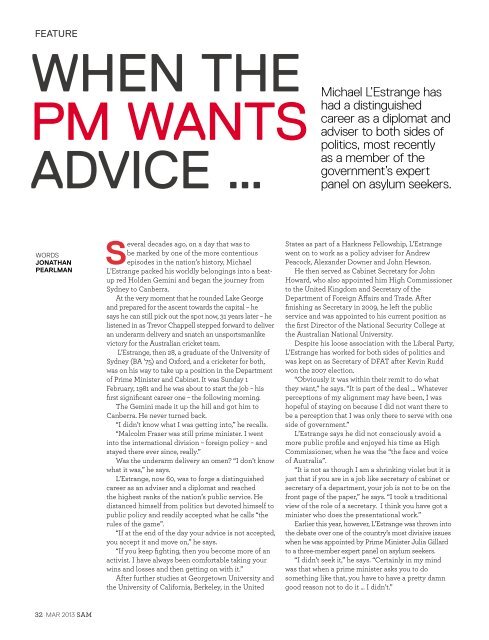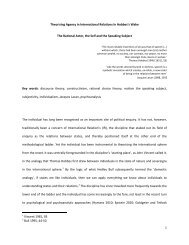Download PDF - The University of Sydney
Download PDF - The University of Sydney
Download PDF - The University of Sydney
Create successful ePaper yourself
Turn your PDF publications into a flip-book with our unique Google optimized e-Paper software.
feature<br />
When the<br />
PM wants<br />
advice …<br />
Michael L’Estrange has<br />
had a distinguished<br />
career as a diplomat and<br />
adviser to both sides <strong>of</strong><br />
politics, most recently<br />
as a member <strong>of</strong> the<br />
government’s expert<br />
panel on asylum seekers.<br />
WORDS<br />
jonathan<br />
pearlman<br />
Several decades ago, on a day that was to<br />
be marked by one <strong>of</strong> the more contentious<br />
episodes in the nation’s history, Michael<br />
L’Estrange packed his worldly belongings into a beatup<br />
red Holden Gemini and began the journey from<br />
<strong>Sydney</strong> to Canberra.<br />
At the very moment that he rounded Lake George<br />
and prepared for the ascent towards the capital – he<br />
says he can still pick out the spot now, 31 years later – he<br />
listened in as Trevor Chappell stepped forward to deliver<br />
an underarm delivery and snatch an unsportsmanlike<br />
victory for the Australian cricket team.<br />
L’Estrange, then 28, a graduate <strong>of</strong> the <strong>University</strong> <strong>of</strong><br />
<strong>Sydney</strong> (BA ’75) and Oxford, and a cricketer for both,<br />
was on his way to take up a position in the Department<br />
<strong>of</strong> Prime Minister and Cabinet. It was Sunday 1<br />
February, 1981 and he was about to start the job – his<br />
first significant career one – the following morning.<br />
<strong>The</strong> Gemini made it up the hill and got him to<br />
Canberra. He never turned back.<br />
“I didn’t know what I was getting into,” he recalls.<br />
“Malcolm Fraser was still prime minister. I went<br />
into the international division – foreign policy – and<br />
stayed there ever since, really.”<br />
Was the underarm delivery an omen? “I don’t know<br />
what it was,” he says.<br />
L’Estrange, now 60, was to forge a distinguished<br />
career as an adviser and a diplomat and reached<br />
the highest ranks <strong>of</strong> the nation’s public service. He<br />
distanced himself from politics but devoted himself to<br />
public policy and readily accepted what he calls “the<br />
rules <strong>of</strong> the game”.<br />
“If at the end <strong>of</strong> the day your advice is not accepted,<br />
you accept it and move on,” he says.<br />
“If you keep fighting, then you become more <strong>of</strong> an<br />
activist. I have always been comfortable taking your<br />
wins and losses and then getting on with it.”<br />
After further studies at Georgetown <strong>University</strong> and<br />
the <strong>University</strong> <strong>of</strong> California, Berkeley, in the United<br />
States as part <strong>of</strong> a Harkness Fellowship, L’Estrange<br />
went on to work as a policy adviser for Andrew<br />
Peacock, Alexander Downer and John Hewson.<br />
He then served as Cabinet Secretary for John<br />
Howard, who also appointed him High Commissioner<br />
to the United Kingdom and Secretary <strong>of</strong> the<br />
Department <strong>of</strong> Foreign Affairs and Trade. After<br />
finishing as Secretary in 2009, he left the public<br />
service and was appointed to his current position as<br />
the first Director <strong>of</strong> the National Security College at<br />
the Australian National <strong>University</strong>.<br />
Despite his loose association with the Liberal Party,<br />
L’Estrange has worked for both sides <strong>of</strong> politics and<br />
was kept on as Secretary <strong>of</strong> DFAT after Kevin Rudd<br />
won the 2007 election.<br />
“Obviously it was within their remit to do what<br />
they want,” he says. “It is part <strong>of</strong> the deal … Whatever<br />
perceptions <strong>of</strong> my alignment may have been, I was<br />
hopeful <strong>of</strong> staying on because I did not want there to<br />
be a perception that I was only there to serve with one<br />
side <strong>of</strong> government.”<br />
L’Estrange says he did not consciously avoid a<br />
more public pr<strong>of</strong>ile and enjoyed his time as High<br />
Commissioner, when he was the “the face and voice<br />
<strong>of</strong> Australia”.<br />
“It is not as though I am a shrinking violet but it is<br />
just that if you are in a job like secretary <strong>of</strong> cabinet or<br />
secretary <strong>of</strong> a department, your job is not to be on the<br />
front page <strong>of</strong> the paper,” he says. “I took a traditional<br />
view <strong>of</strong> the role <strong>of</strong> a secretary. I think you have got a<br />
minister who does the presentational work.”<br />
Earlier this year, however, L’Estrange was thrown into<br />
the debate over one <strong>of</strong> the country’s most divisive issues<br />
when he was appointed by Prime Minister Julia Gillard<br />
to a three-member expert panel on asylum seekers.<br />
“I didn’t seek it,” he says. “Certainly in my mind<br />
was that when a prime minister asks you to do<br />
something like that, you have to have a pretty damn<br />
good reason not to do it ... I didn’t.”<br />
32 mar 2013 SAM
















